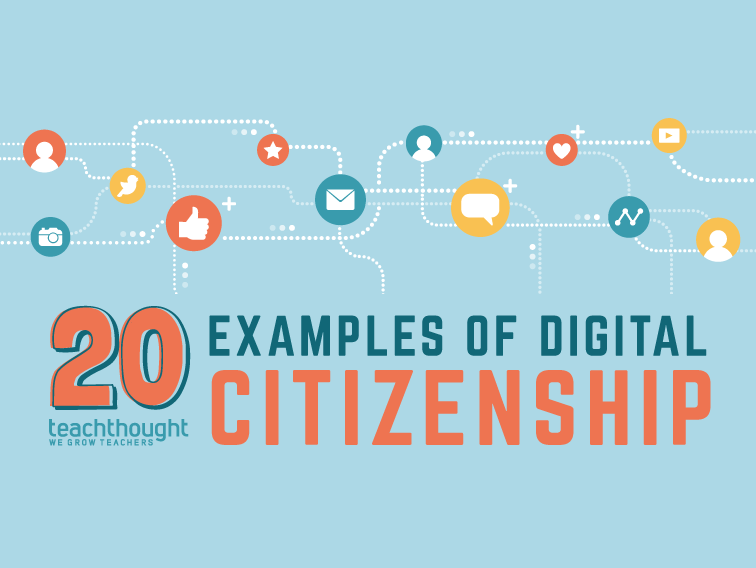
What Are The Best Examples Of Good Digital Citizenship?
by TeachThought Staff
What is good digital citizenship?
Previously, we’ve offered a definition of digital citizenship in the past. Below, we offer some specific examples of good digital citizenship. From communicating with on social media with clarity and respect to respecting other’s privacy to thinking critically and carefully about ideas and conversations and events before responding or contributing, practicing good digital citizenship is often a matter of the golden rule–and a little bit of common sense.
20 Examples Of Digital Citizenship
1. Think Critically
It may not seem so, but thinking clearly and critically is at the heart of any form of citizenship. That’s actually a worthwhile topic for another post entirely, but for now, consider that thinking critically about the things you read online (and off)–especially sensationalized headlines and other misleading or polarizing content meant to elicit an emotional response in readers–is good digital citizenship 101.
Also examples? Avoiding cognitive bias and logical fallacies, fact-checking information, grasping the subtleties in points being made in published content or social media, and more are all examples of digital citizenship.
2. Monitor
Monitoring the net effect of your activity online–both the effect of online ‘on you’ and how you affect things online.
3. Respond
Responding to a question you have the background or knowledge to answer.
Responding to a comment you disagree with–but doing so with respect and acknowledge of alternative perspectives and the standards upon which your position rests–is an example of digital citizenship.
4. Contribute
Adding helpful information/context to a discussion or wiki page.
5. Cite
Citing the source of the original source of information or media on twitter or tagging the original rights holder on Instagram.
6. Elevate
Elevating a discussion–the tone of an interaction in a discussion on Quora or YouTube, for example–is an example of good digital citizenship.
A closely-related example would be responding to rudeness and name-calling with wisdom and kindness.
7. Protect
Protecting someone from cyberbullying or protecting account info with secure passwords changed regularly or protecting a website by letting someone at the site know there’s a technical vulnerability.
8. Clarify
Clarify someone else’s point, data, or position on an issue before attempting to counterpoint during an online debate.
9. Help
Whenever possible–whether on a Wiki, social media platform, website comments section, or somewhere else–helping people who need it is good citizenship anywhere, online or off.
10. Assume the best
In discussions and other digital-only interactions, assuming the best in other people can be good digital citizenship provided that you’re protecting yourself and mitigating any risk or damage to you or the community.
11. Consider
Related to critical thinking, considering ideas from other perspectives is crucial to empathy–which itself is crucial to digital citizenship.
12. Report
If something needs reported–dangerous behavior, bullying, suicide threats, violence, etc.–find out who they ‘authorities’ are in that context and reporting it is good digital citizenship.
13. Share
Sharing your specific talent, passion, or expertise in a way that inspires others.
Sharing content on social media you find valuable and would like to see more of.
14. Thank
Thanking content creators, tech support, forum moderators, etc., for their efforts and contributions in/on the platforms and communities you depend on and enjoy.
14. Attribute
Properly using the Creative Commons attribution framework is an example of digital citizenship.
15. Update
While not all updates are ‘good,’ not updating operating systems, apps, firmware on hardware, and other software can reduce the stability of security of the technology you depend on. Updating intelligently is an example of being a ‘good digital citizen.’
16. Verify
Resisting social media-based ‘attacks’ based on events you lack specific expertise or first-hand knowledge on/about.
17. Secure
While updating technology is a part of security, so is changing passwords, maintaining possession and control of your mobile devices, using secure websites (https, for example), not saving passwords on public computers, only using safe WiFi connections–and on and on and on. These are all examples of digital citizenship.
18. Read carefully
A very general–and under-practiced–form of digital citizenship? Reading with comprehension.
Similar to thinking critically, reading carefully and with comprehension on social media ensures you actually know what’s be
ing said before you respond to it. For example, read the whole article if you’re going to comment on it. Read the terms and conditions before you accept them. Read (and fully grasp) the comment–and the entire comment thread, at times–if you’re going to participate in a social media-based ‘discussion.”
19. Double-check
Verifying anything you claim, publish, or share is true (e.g., not spreading misinformation or hearsay)–while also being sure to properly contextualize even ‘truths’–is an example of good digital citizenship.
20. Support
Supporting others by offering useful feedback, encouraging them, or sharing work they’re proud of, etc.
20 Examples Of Digital Citizenship